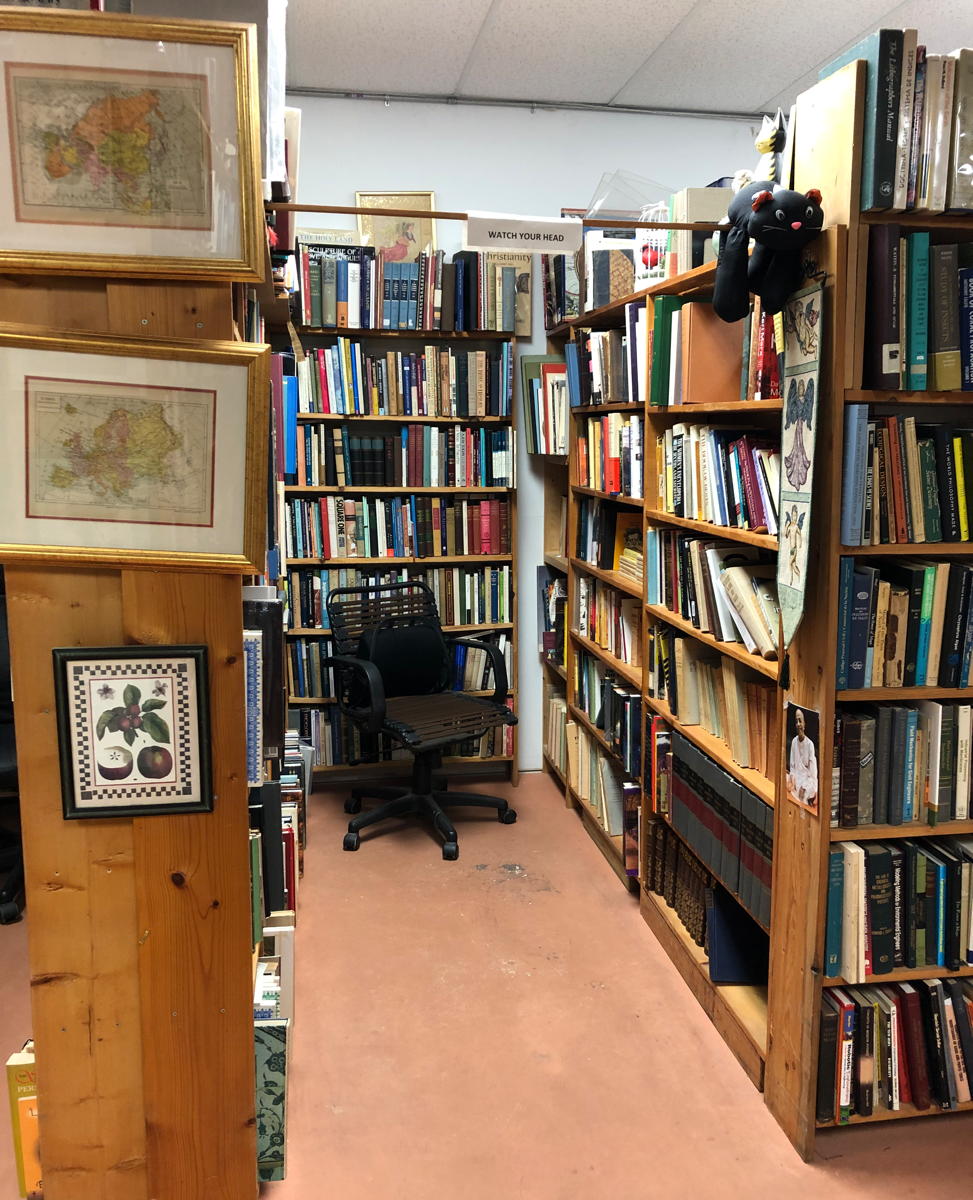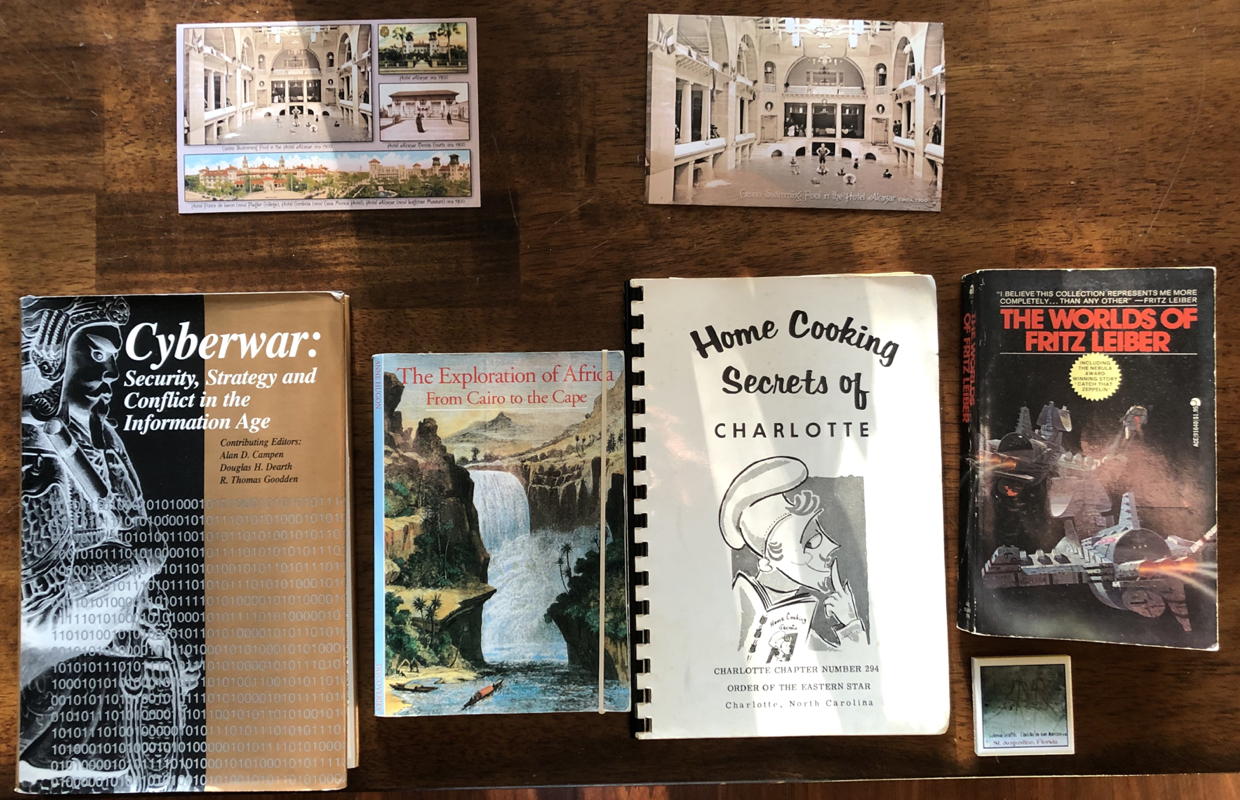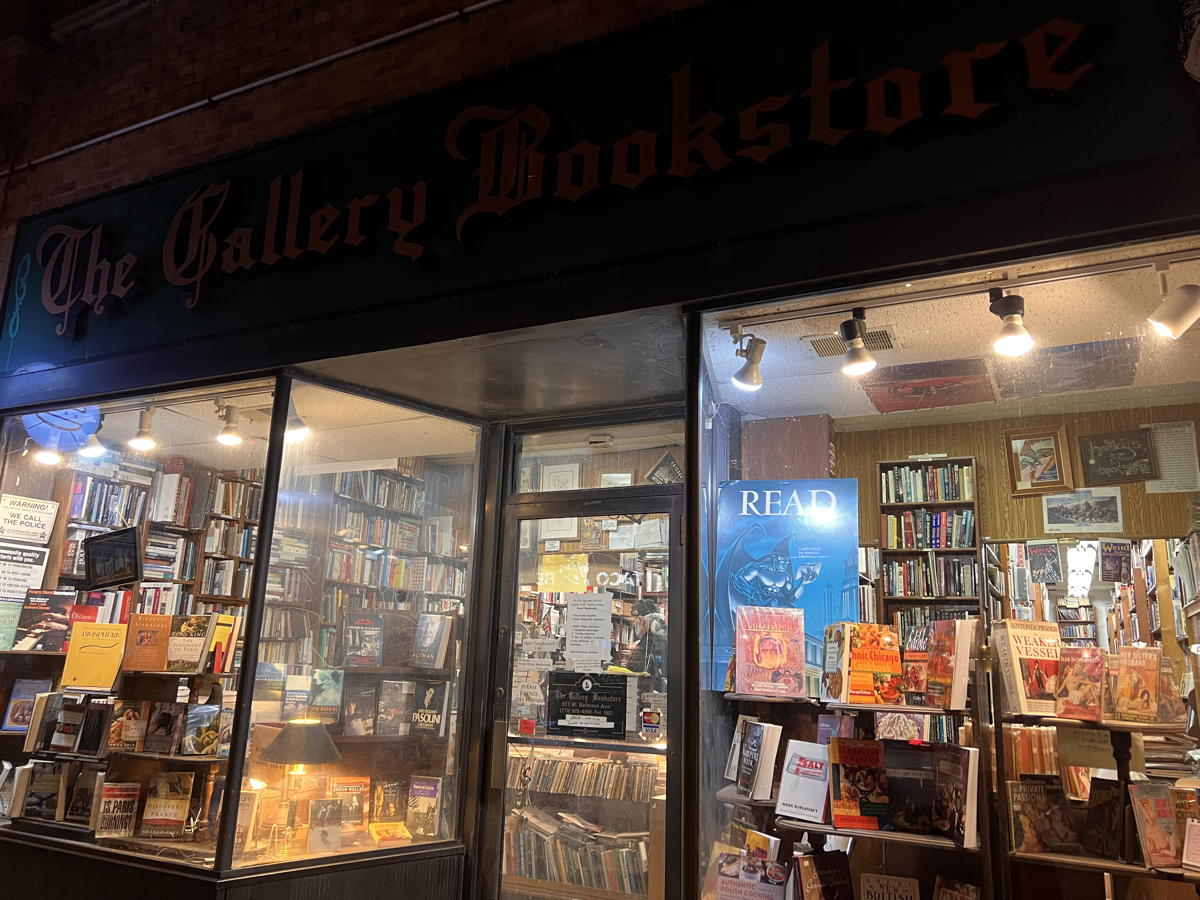My Year in Books: 2021
Man looks for patterns in everything, but I don’t think I could have chosen a better opening quote for the first review of the year:
…man is born to trouble, and it is best to meet it when it comes and not lose sleep until it does. — Louis L’Amour (The Daybreakers•)
But then, Louis L’Amour is a great author to start any year with. I followed The Daybreakers up with Shalako and Conagher with a little detour through The Iron Marshall. I ended the year with Radigan.
L’Amour continually surprises me by coming up with very different takes on the Western hero. His heroes in each of those stories are very different. They run the gamut from wild men coming in from the desert, to big city gangsters on the run, to (almost) backwoods lawyers defending their ranch.
And then, in June in Nashville, I discovered his autobiographical Education of a Wandering Man. He lived a fascinating life, and it’s not hard to see where he got his ideas for such varied characters when you see what a varied life he’s led!
I also finally read Asimov’s Foundation trilogy. I’d read the first book long ago, but never the series. I picked up a boxed set of the trilogy at a yard sale back in 2017, but it looked like a dense read and it took a while to commit to reading all three.
It was a dense read; there is a lot of weird retro psychology going on. It’s fascinating both as a well-written story and as a glimpse into the mindset of one class of science fiction author in the golden age. Asimov took what most authors, and most people, would regard as a nightmare: a benevolent dictatorship rewriting history down to the contents of your brain, manipulating people into false insights, conspiracy, and even a deadly galactic war, all for their view about how the tide of history should flow.
It’s not at all surprising that Foundation became influential. There are many people who would like to believe that they can predict the future with such accuracy, and who do believe that they are smart enough to guide humanity and lift it out of chaos.
This was also a good year for buying books. I bought fewer—about sixty fiction and nonfiction books—but what I bought! I went to St. Augustine in February, and found a couple of odd books. Anne Hugon’s The Exploration of Africa: From Cairo to the Cape is beautifully designed. It’s filled with wonderful photos and illustrations and writings about the great Western explorers of Africa. It especially highlights Livingstone and Stanley, of “Dr. Livingstone, I presume” fame. It’s a bit of history I never had clear in my head, and this neat little book helped clarify the motives people had for leaving home and family to study this new, to them, land.
It also ended being related to another slow-running self-education project of mine, reading up on the history of slavery, mainly the era running up to Lincoln’s election and the Civil War.
One of the major reasons for exploring Africa was to end slavery there. Among the many differences between cultures, it is difficult to argue that slave cultures are morally equivalent to non-slave cultures. It’s also wrong to denigrate education, as the author does by conflating a “belief in the superiority of the white man” with a belief that superiority between cultures, rather than being innate, are “the result of education”.
If Livingstone believed that the white man’s superiority was the result of education, and that Africans would be equal with similar education, then he did not believe in the superiority of the white man, a phrase that has a specific meaning; nor, for that matter if by “the influence of Christianity” he meant the belief that slavery was wrong, was he wrong about that education’s moral superiority.
Frederick Douglass has similar things to say in My Bondage and My Freedom, which I read in December. He talks a lot about the horrible influence on slave culture of the denial of education.
To make a contented slave, you must make a thoughtless one. It is necessary to darken his moral and mental vision, and, as far as possible, to annihilate his power of reason. — Frederick Douglass (My Bondage and My Freedom)
He describes how freedom has created in “northern labor” a “superior mental character” that encouraged skill and efficiency. Slavery held back not just “comfort and refinement” but the very progress of civilization. One of the big differences between slave and free society was that in his new home in the North, education wasn’t just not denied, it was encouraged “side by side” with everyone.
There, in New Bedford, the black man’s children—although anti-slavery was then far from popular—went to school side by side with the white children, and apparently without objection from any quarter.
Before each of these books, I read Lucas E. Morel’s Lincoln and the American Founding. Morel describes how Lincoln viewed the founding documents as freedom documents, in the most literal sense. Lincoln argued that these tools to end slavery and fulfill the promise of the Declaration had been put there specifically for that purpose. Morel writes that Lincoln re-entered politics because Democrats were rewriting the constitution without amending it, attempting to make slavery a good thing rather than something that must be eradicated over time, as Lincoln believed the Constitution was meant to do.
Lincoln would have recognized modern politicians who rail against walls while living behind them; who forbid self-defense while hiring armed security. In his day, the same politicians praised slavery but…
…although volume upon volume is written to prove slavery a very good thing, we never hear of the man who wishes to take the good of it, by being a slave himself. — Abraham Lincoln (Lincoln and the American Founding•)
“It is the only good thing,” Lincoln wrote, “which no man ever seeks the good of, for himself.”
The strangest book from St. Augustine is Cyberwar: Security, Strategy and Conflict in the Information Age. It’s a collection of essays about how the information age will affect war and war preparation. It’s a fascinating look at how the military in the nineties saw the coming information revolution.
Its biggest failure was, continually, essay after essay, to take the big leap. They would say something potentially profound, and then ignore it or treat it as a joke.
According to Peter Schwartz, by the year 2001 there will be over 2 billion teenagers in the world, most of them living in Asia and Latin America. Imagine trying to get a telephone call through to someone’s home in Mexico City or Beijing when that happens!

H. Rider Haggard, James Tiptree Jr., the search for Pluto, and a couple of community cookbooks. The Temple library sale was very fruitful.
The more astute joke would have been, “imagine how telephones will change when that happens!” That is, imagine how telephones will change when everyone is trying to use them at the same time. What we’d get would be mobile phones that anyone can carry, that don’t lock up the modem because no modem is necessary.
This is similar to my complaint about hard science fiction: that too often it is called “hard science fiction” because it assumes that current problems with technology will remain a problem in the future, when in fact the smart money in a free society is always on such problems being solved. Like good science fiction, good analysis should focus not on how society will change because of this problem (the classic Malthusian-level analysis) but on how society will change when that problem is overcome.
A more serious failure to go that further step comes later in the same article:
With the destruction or disabling of his command and control capability and the ability to influence the perceptions of his policy elites and population, there is the possibility to work one’s will upon the opponent without necessarily wreaking physical havoc upon the infrastructure and population of one’s enemy.
What if the ability to influence the perceptions of policy elites was separate from the ability to influence the perceptions of the general population? Taking that next step might well have predicted, and vaccinated policymakers against, the kind of influence we’ve seen over how to handle a pandemic, where policy experts seem to be at war with the population. Even to outright killing them, as happened with the disastrous decisions in several states to house COVID patients with the especially vulnerable elderly.
Possibly the most prophetic of the statements from this book is Richard Szafranski’s that the United States must be prepared for attacks not just on data, but on belief systems.
The United States should expect that its information systems are vulnerable to attack. It should further expect that attacks, when they come, may come in advance of any formal declaration of hostile intent by an adversary state. When they come, the attacks will be prosecuted against both knowledge systems and belief systems, aimed at influencing leadership choices. The knowledge and beliefs of leaders will be attacked both directly and indirectly. Noncombatants, those upon whom leaders depend for support and action, will be targets. This is what we have to look forward to in 2020 or sooner.

I didn’t get much in the way of books in Miami, but what I did get was one amazing Victor Davis Hanson-edited book about Hoplites at Dunbar Old Books.
It’s hard to blame military pundits for getting the future wrong, however, after reading Harry Harrison’s Make Room! Make Room!. I’m still not sure it wasn’t a complete put-on. Everything he’s said about the book is that it’s about the problem of overpopulation, and yet all of the problems in the book are clearly caused by public policies that cause scarcity. Further, he subtly flags all of those policies, from the lack of drinking water (fresh water is everywhere in the book, and no-one thinks to collect it) to the prevalence of disease (the more sick you are, the better food you get). At the same time, population really hasn’t grown much between 1967 when Harrison wrote the book and 1999 when it takes place.
It’s almost as if Harrison were writing a version of Kornbluth’s Marching Morons, combining it with John Campbell’s advice to never mention stuff that the characters in the story would never mention. Just let the readers make their own conclusions like any person in the story would.
Did Harrison really mean that overpopulation was an excuse by an incompetent expert class to inflict pain and misery on everyone? It’s hard to believe—but it makes more sense than saying that the world of Make Room! Make Room! was caused by a less than doubling of population in the United States.
Come Autumn, the library book sales in both Temple and New Braunfels opened up again, so I didn’t have to go out of state to find fascinating new books. The Temple sale was particularly fruitful.1 I picked up The Works of H. Rider Haggard and finally read She as well as two Allan Quatermain stories. They’re very different from the picture of Quatermain I’d picked up from pop culture references. It’s not hard to see why Haggard was so influential on a generation or more of adventure writers. Like Louis L’Amour, he’s able to take on vastly different protagonists and make them interesting and different.
James Tiptree Jr.’s2 Brightness Falls from the Air was also a joy to read. It’s a perfect science fiction mystery. Everything we need to know is presented up front, but so deftly as to invoke our sympathy rather than our reason. In every part of this story, from the administrators to the visitors to the history, nothing is what it seems.
Clyde Tombaugh’s Out of the Darkness is a fascinating look at the how and why of the search for Pluto. Tombaugh and co-author Patrick Moore wrote it around the 50th anniversary of Tombaugh’s discovering Pluto through a very painstaking search of the sky. It’s a good example of why scientists must remain skeptical. Pluto fit Lowell’s theory of a trans-Neptunian planet about as perfectly as you could ask at the time. The chances of finding it being a coincidence seemed astronomically low, literally. Yet it was a coincidence that they found it there.
As evidence of Pluto’s incredibly small size began to mount, Tombaugh writes, they all began to suspect that it could not possibly be the Neptune-affecting planet they’d been looking for. Tombaugh himself continued the very painstaking search across the ecliptic for both unknown planets and any objects big enough to see. It took more than a decade, and the search continued up to when he was drafted in 1943.
I found a copy of M. John Harrison’s Viriconium Nights in Birmingham on the way to a Tennessee science fiction convention. It takes place after The Pastel City, to the extent that time means anything in this Rome-like city where the elegant queen has been replaced by a more vulgar monarch. There’s a plague zone, and it’s growing. Its effect is less of disease than of enervation. There are masks everywhere, and low-rent mystics to make up for the failing and fading technology of the old ancients.
“My life is like a letter torn up twenty years ago,” she said in a low, anguished voice. “I have thought about it so often that the original sense is lost.”
“My life is like a letter torn up #twoweeks ago,” the character might say if it was written today. It’s odd that M. John Harrison’s utterly fantastic and deliberately unrealistic Pastel City tale is the most eerily prescient of 2021’s books. But I find that almost always is the case: the harder the science, the less the book says about the future, and the more fantastic, the more likely it is to come true.
Whether this is a good or bad thing is up for us to decide in 2022. Happy New Year!
In response to The Case for Books in 2015: In 2015, I read a lot of books… and bought a lot more. That’s not a sustainable market plan.
I’ll talk more about New Braunfels in my 2021 in Food post later.
↑- ↑
2021
- Goodreads: Year in books 2021 at Jerry@Goodreads
- The most popular book I read in 2021 was Isaac Asimov’s Foundation. Of the 26,126 pages read, a lot of them were from the Foundation series.
- My Year in Food: 2021
- From Washington DC to San Diego and one or two places in between, it’s been a very good year for food.
biographical
- James Tiptree, Jr.: The Double Life of Alice B. Sheldon•: Julie Phillips (paperback)
- This is the fascinating story of a woman who pretended to be a man while writing groundbreaking science fiction and corresponding with the rest of the best science fiction authors of her day.
- Review: Education of a Wandering Man: Jerry Stratton at Jerry@Goodreads
- Reading is civilization; without books we have only the present or a few generations past. L’Amour clearly loves books, reading, and the search for obscure books by forgotten people who had something important to say about life in their era.
- Review: Lincoln and the American Founding: Jerry Stratton at Jerry@Goodreads
- Abraham Lincoln saw the Constitution as having been written to fulfill the principles of the Declaration of Independence, and that included the abolition of slavery. He re-entered politics because he could not abide by Democrats rewriting the constitution to turn it into a pro-slavery document, putting the freedom of everyone in jeopardy.
- Review: My Bondage and My Freedom: Jerry Stratton at Jerry@Goodreads
- Douglass takes the same facts as in The Narrative of the Life of Frederick Douglass and adds the insights of ten years living in freedom.
- Review: Out of the Darkness: Jerry Stratton at Jerry@Goodreads
- How and why did we find Pluto, and what did Neptune have to do with it?
- Review: The Exploration of Africa: Jerry Stratton at Jerry@Goodreads
- Dr. Livingstone, I presume? What was behind the great Western explorers of uncharted Africa?
futurism
- Future Snark
- Why does the past get the future wrong? More specifically, why do expert predictions always seem to be “hand your lives over to technocrats or we’ll all die?”
- Hobby Computer Handbook
- Hobby Computer Handbook was a short-lived relic of the early home computer era, an annual (or so) publication of Elementary Electronics.
- Review: Cyberwar: Jerry Stratton at Jerry@Goodreads
- “This book wasn’t particularly readable or well-edited, and didn’t turn out, in retrospect, to have much to say about the future. The writers tended to avoid specifics and mostly say what their clientele in the military and related industries wanted to hear.”
science fiction
- Review: Brightness Falls from the Air: Jerry Stratton at Jerry@Goodreads
- A parlor room mystery on the lone hostel of planet Damiem, amidst a planet-destroying nova front caused by human… what?
- Review: Foundation: Jerry Stratton at Jerry@Goodreads
- The fall of empire is a massive thing, and not easily fought. But it makes a great starting point for fiction.
- Review: Make Room! Make Room!: Jerry Stratton at Jerry@Goodreads
- What if, instead of progress, we had stopped technological progress to deal with overpopulation? We might have a world like Harrison describes, a nightmare of starvation in the midst of plenty.
- Review: Second Foundation: Jerry Stratton at Jerry@Goodreads
- Asimov takes what most people would regard as a nightmare, a benevolent dictatorship that can rewrite memories for your own good so as to guide civilization to where they think it should go.
- Review: The Works of H. Rider Haggard: Jerry Stratton at Jerry@Goodreads
- Four of Haggard’s novels cover the gamut of different styles and characters: Cleopatra, She, King Solomon’s Mines, and Allan Quatermain.
- Review: Viriconium Nights: Jerry Stratton at Jerry@Goodreads
- M. John Harrison has a way of trying too hard that doesn’t fall short when he fails.
westerns
- Review: Conagher: Jerry Stratton at Jerry@Goodreads
- Among the best of Louis L’Amour books; slow-talking, fast action, and nothing said twice. Sleepless in Seattle for the old west.
- Review: Radigan: Jerry Stratton at Jerry@Goodreads
- Tom Radigan did not take chances. But he helped bury men who did.
- Review: Shalako: Jerry Stratton at Jerry@Goodreads
- A harsh depiction of the individuals of the west, and a beautiful depiction of the wide open spaces those individuals wandered.
- Review: The Daybreakers: Jerry Stratton at Jerry@Goodreads
- Man is born to trouble, and few are better at writing about such men than Louis l’Amour.
- Review: The Iron Marshall: Jerry Stratton at Jerry@Goodreads
- Tammany Hall meets the old west? L’Amour never fails to surprise.
More 2021
- My Year in Food: 2021
- From Washington DC to San Diego and one or two places in between, it’s been a very good year for food.
- November 2021 Texas propositions
- There are several proposed amendments to the Texas constitution on the ballot November 2. Here are some quick summaries of what they mean.
More annual retrospectives
- My year in food: 2022
- From New Year to Christmas, from ice cream to casseroles, from San Diego to New Orleans, from 1893 to 2014… and beyond!
- My Year in Books: 2022
- From Hoplites to Venice… California, this has been a year in books filled with war, evil, and the dehumanization of man. But it’s also been a year of high adventure, magic, and larger-than-life heroes.
- My Year in Food: 2021
- From Washington DC to San Diego and one or two places in between, it’s been a very good year for food.
- The Year in Books: 2020
- What did 2020 have to offer in books?
- The Year in Books: 2019
- 2019 was a great year for reading old books.
- One more page with the topic annual retrospectives, and other related pages
More books
- My Year in Books: 2023
- It’s been a slower year in books than previous ones, but it was still a year of fantasy in the past, in the future, and across time, as well as an unplanned foray into people doing the impossible and changing the world.
- My Year in Books: 2022
- From Hoplites to Venice… California, this has been a year in books filled with war, evil, and the dehumanization of man. But it’s also been a year of high adventure, magic, and larger-than-life heroes.
- The Year in Books: 2020
- What did 2020 have to offer in books?
- The Year in Books: 2019
- 2019 was a great year for reading old books.
- The Year in Books: 2018
- Have I got some recommendations for you…
- One more page with the topic books, and other related pages





